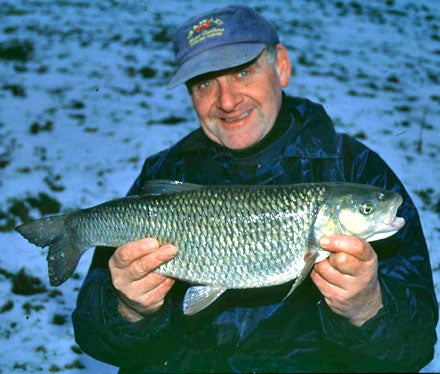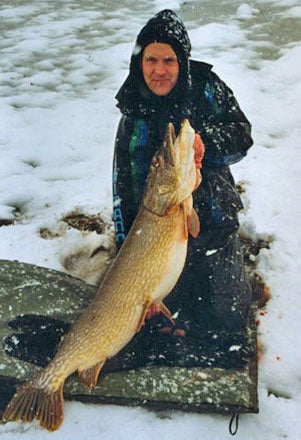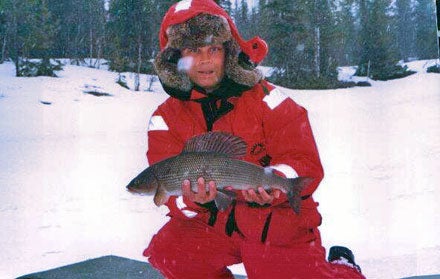Keeping Warm in WinterIT’S NOT SOMETHING everyone wants to do, but there are quite a few of us around who actually love to see snow falling as we fish (read Mark Hodson’s article on winter fishing). In recent years however, we’ve had very few real snowfalls, but early in the new year it is predicted that plenty of ice and snow is on its way. So here is some advice on looking after yourself, including the inner man.
Cold, frosty mornings are not everyone’s cup of tea, but I’m a bit strange that way (and in other ways too if you listen to my mates!) for I actually look forward to them, especially when there is fresh snow on the ground and big flakes are falling from a heavy sky. I’m not unique, I know quite a few anglers who actually prefer to fish in winter. That isn’t quite the case as far as I’m concerned, for, although I love my winter fishing, I love my summer fishing equally as well. The truth of the matter is that by the time either the summer or winter period is almost over, the following period looks particularly inviting. In other words, I’m ready for a change. Some years ago, when we still had some really interesting snowfalls through winter, I used to risk life and limb to drive the 100 miles and more to and from the upper Severn to fish for chub. It was always best when the snow was freshly fallen and lay new and soft on the ground. Not simply for the reason that everywhere looked and felt good, but because the water had not been subjected to too severe a drop in temperature. In fact a good snowfall usually follows a slight rise in temperature. The next best time is following a freeze-up after it has snowed for several days, when the temperature is climbing and the snow is beginning to melt – but before too much melting snow water has ran into the river. I used to set off in the afternoon so that I would arrive at least an hour before darkness fell. I’ve fished in some really savage, awesome blizzards, caught chub, and thoroughly enjoyed myself. I used to go home feeling invigorated and that I had conquered my own little Everest. Daft, I know, but what the hell! If we get the right conditions I’m going to do it again this winter. The outer man – wear the right clothingThe first and obvious consideration before you even attempt to set foot on the river bank in winter is clothing. Get yourself kitted out with clothing that not only keeps the cold out of your bones, but is comfortable and easy to move around in. There is nothing worse than being wrapped up so tightly it becomes hard work just to cast, let alone move from one peg to another. This means that clothing should be loose and not restrict walking, bending and arm movements. Loose clothing is also the warmest clothing, so whatever type of garment you wear, make sure it is at least one size too large. This applies to jacket, overtrousers, bib and brace, one-piece suit, and footwear. But let’s start from the skin and work our way to the outer garments.
You can’t beat a good quality thermal tee-shirt and long johns next to your skin, then a pair of baggy trousers (jogging pants are excellent, and definitely not tight jeans) and a loose-fitting sweatshirt or pullover. That can often be enough if the type of fishing you’re doing involves movement, like trotting for example. In exceptionally cold weather and when sat for long periods, when the wind is cold enough to cut you in two, wear a fleece jacket as well. The best outer garment for overall warmth is the one-piece suit, for it is the next best thing to a sleeping bag, containing your body in a pocket of warm air from neck to ankles. Jacket and bib and brace are second best and my personal preference, for then I can remove one or the other if I get too warm. There is no middle ground with the one-piece suit. Whatever you wear it’s got to be waterproof, but don’t think that all you have to do is throw an old oilskin, or some other kind of plastic garment, over the top of your warm clothing when it rains or snows. If you do that you’ll get almost as wet from the inside due to condensation and sweat going cold. It costs more, a lot more for the best, but in my view it is essential to invest in outer garments that are made from a breathable fabric such as Goretex, which allow your body to breathe without permitting water to penetrate from the outside. Choose a jacket or one-piece suit that has a hood with a draw-string that, when tightened, almost encloses your face. Most of the time I wear a baseball-type hat under the hood with the peak sticking out so that my eyes (spectacles) have some protection, specially when it’s raining. When it’s very cold I wear a woolly hat or balaclava as it’s most important to keep your head warm. Seal the neck-hole of your jacket or suit off with a nice, soft, woollen scarf or dedicated neck warmer. The warmest footwear is the so-called moonboot, which has a thick, thermal lined sole, and a thermal lining up the legs, though not the best of footwear for walking in. Next best, when the conditions are not wet and muddy, are a stout pair of leather boots. Good quality walking boots, a size too big to allow for two pairs of socks, with one pair being thermal, are excellent. Ordinary wellingtons and waders are probably the worst thing you can wear, but if you have to, make sure they are at least one size too big, and wear two or three pairs of socks. There are one or two thermal-type waders on the market, so check these out too. Finally, at least as far as outer garments are concerned, are gloves. When the conditions are not wet I much prefer a pair of fingerless woollen gloves. Wet weather means a pair of fingerless neoprene gloves, neoprene being the material used for wetsuits, that does absorb water, but maintains body temperature. The secret with neoprene is to put it on a warm body, not a cold one. Mittens are better for warmth, but more restricting. Though there are mittens available where the finger section folds over and velcros to the back of your hand leaving your fingers free, if that is what you prefer. You don’t need a brolly, and won’t want one if you intend to roam around somewhat, especially when river fishing. A brolly is a comfort though, when you intend fishing from the one peg for the length of a session. It’s nice to watch the rain or snow from under cover, and to be behind a windbreak. Otherwise, for all-day sessions when you’re playing a waiting game, as in some aspects of pike and carp fishing, there are some nice shelters you can use that weigh no more than a 50in brolly and can be set up almost as quickly. Looking after the inner manOK, now you’re ready for anything the weather can throw at you. We’ve got you covered from head to toe in waterproof, warm clothing that you can actually fish in without feeling you’ve been slapped in a straight jacket. Now it’s time to look after the inner man. When on the move, or pursuing an intense form of fishing, such as float fishing on the river, where you are continually on the go, it has to be drinks from a flask. Unless, of course, you are prepared to stop fishing for a spell and make a fresh brew on a stove. Which, of course, is fine if the fish are not feeding too well and you welcome the break. Not so fine if the fish are feeding well, following some smart, prolonged feeding by you, and you have them crawling up the rod. Me, I’m loathe to take the time to pour a drink from a flask when I’m faced with that kind of situation. But there is always a lull in the proceedings at some time, and you can enjoy your drink from the flask while continuing to feed the swim. The best flasks are the stainless steel ones, not because they are almost unbreakable (which is a plus factor anyhow) but due to the fact that a good quality stainless steel flask will keep drinks hotter, for longer, than an ordinary flask.
The only thing that goes in my flask is boiling water. I reckon there’s nothing worse than flasked tea and coffee. I carry tea bags, coffee, sugar and milk separately. This gives me several advantages. The flask stays untainted and therefore so do my drinks. The drink is hotter to begin with, but can be cooled to my liking with milk. I enjoy both coffee and tea, and the odd cup of chocolate-type drink. I like more milk in coffee than I do in tea, and I take sugar in coffee but not in tea. My way, I can enjoy whatever drink I fancy, in the way I fancy it. It takes a little more trouble, but is well worth the effort. Pretty often I also carry a smaller flask just big enough to hold a can of hot soup. That goes down well with sandwiches, or just dry bread for dipping in the soup. When under the brolly, or in a bigger shelter for a longer session, you can’t beat a stove and all the materials you need to make a fresh brew and hot food. And I don’t know of any food, gourmet type food included, that smells and tastes better than bacon when it is being fried outdoors, specially in cold conditions. Two or three, or even four, doorstop-size bacon butties dripping with brown sauce sets you up for the day, and you will have a job to find anything that tastes better. Alcohol: I like a drop now and then, but it is a fact that alcohol does not warm you up. In fact it causes heat loss, so be careful how much you have. And don’t have any if you’re driving. I must confess, however, that when I’m not driving I do enjoy the odd nip from my little pewter flask, and a drop or two in my tea and coffee. I can’t say it either warms me up or cools me down, though I can say it gives me the illusion of warming me up. And I like it. The best way of keeping warm in winter, however, and for a general feeling of well-being, is to catch fish. No matter how foul the conditions, and no matter how much you may have been whinging about it, you’ll forget all that when you’re getting your rod bent regularly. It’s amazing how much pain and discomfort your body and mind can ignore when it is preoccupied with something pleasurable. So regardless of all the advice I’ve given you on how to keep warm and comfortable, it is still most important to do everything you can to ensure you catch fish. Catching fish regularly, summer or winter, is the best way to enjoy yourself, no matter what the weather throws at you. |
Welcome!Log into your account













